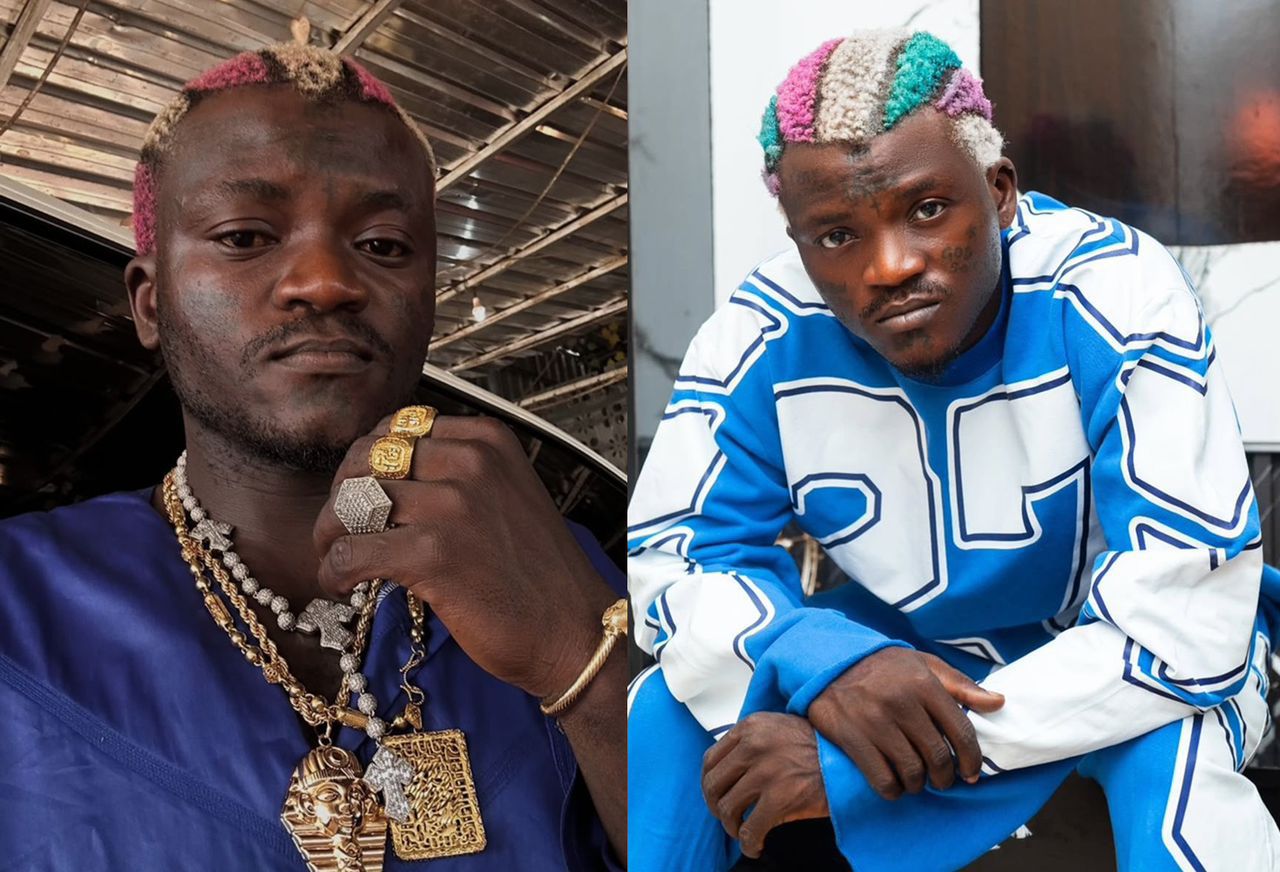
“If I touch him now, you people will start shouting ‘justice for him’” — Portable lashes out as lookalike allegedly pockets his shows

Controversial street pop star Habeeb Olalomi Badmus, popularly known as Portable, has fired a blistering public warning after videos and reports surfaced online alleging that a man resembling him has been impersonating the artist and taking paid performances in his name. In a blunt message shared on social media, Portable told fans and onlookers that if he were to physically confront the impersonator they would rush to defend the lookalike — shouting “justice for him” — and suggested, with characteristic defiance, that those who spot the impostor should deal with him themselves rather than expect intervention from the real artiste.
The drama appears to have escalated after clips circulated showing a man performing at events while adopting Portable’s signature vocal stylings and stage antics. Some event-goers reportedly handed cash to the impersonator for performances, believing they were dealing with the Zazuu Zeh crooner. Portable’s team say this has caused confusion and direct financial loss, with one report claiming the impersonator pocketed as much as ₦250,000 for a single appearance — a fee Portable described as pathetic compared to what he says he commands. The singer explicitly warned that all legitimate bookings must go through his verified team to avoid being duped.
In the short video clip of the artist addressing the controversy, Portable’s tone alternated between amusement and menace. He dismissed the notion that anyone could truly imitate him, saying the difference between him and the impersonator was plain for anyone to see. Yet he also warned the impersonator to “be careful,” insisting that if anything untoward happened to the lookalike people should not point fingers at him. “I heard that someone who said he is my look-alike is taking my shows. Nobody can be like me. He can't talk like me… Dear look-alike, be very, very careful,” Portable said, as captured and reposted across multiple social platforms.
The episode highlights a growing problem for popular entertainers on Nigeria’s bustling gig circuit: impersonators and online fakers who exploit a celebrity’s brand for quick cash. Portable — no stranger to controversy and viral moments himself — has in the past been involved in public disputes and physical altercations that have split opinions among fans and critics alike, making his latest warning especially combustible. Critics worry that the performer’s combative rhetoric could fuel vigilantism or further entrench a culture where disputes spill off social media and into the streets.
Social media users who shared videos of the impersonator have drawn thousands of comments, with some laughing at the audacity of the lookalike and others alarmed that organisers could be so easily duped. A number of commentators questioned how event planners failed to do basic checks on performers — a gap in professionalism that has now been seized on by opportunists. Event organisers and venue managers, who rely on reputation and trust when booking acts, are being reminded of the risks of inadequate vetting, especially when dealing with headline names whose fees and draw are substantial.
Portable’s public reaction was swift and unequivocal: while he insisted he would continue to honour legitimate gigs, he made it clear he would not entertain impostors cashing in on his fame. “If I touch him now, you people will start shouting ‘justice for him’. You people should beat him yourselves,” he said, a line that has been clipped and reused in dozens of reposts across Instagram, Twitter (X), and WhatsApp. That particular phrasing — equal parts taunt and challenge — crystallised the tension between celebrity accountability and the messy reality of celebrity culture in a digital age where identity is easily spoofed.
Some observers have urged caution, arguing that while public figures have every right to protect their brand, inciting the public to punish alleged impostors risks normalising extra-judicial responses. Legal experts who monitor entertainment disputes warn that impersonation, fraud, and misrepresentation at paid events are civil and, in some cases, criminal matters — best handled through contracts, police reports, and event insurance rather than street justice. Portable’s own history of confrontations makes any hint of physical retaliation especially sensitive; many fans remember previous episodes involving the singer that drew heavy criticism online.
Meanwhile, the man alleged to be posing as Portable has been the subject of online sleuthing and mockery. Some videos identify the impersonator as a comedian or local performer trying to leverage the star’s persona for viral attention. Others say opportunistic middlemen may be orchestrating the scheme — booking the lookalike to perform at smaller events and pocketing the proceeds while claiming the gig was “Portable-approved.” Portable’s camp insists it is tracking bookings and will clamp down on any fraudulent activity that undermines his brand.
As the controversy spreads, it exposes the fragility of fame built in the social media era: celebrity is simultaneously amplified and vulnerable. Artists whose rise is steeped in viral moments find their images and sounds easily replicated, while organisers and fans struggle to separate genuine appearances from counterfeit ones. Portable’s public admonition — half-warning, half-provocation — has forced a broader conversation about how to safeguard performers’ reputations and protect consumers against scams.
For now, Portable appears determined to reclaim control of the narrative. He has urged fans to report anyone they suspect of impersonation and to insist that future bookings be verified through official channels. Whether that will be enough to deter impersonators — or whether the episode will spiral into a public confrontation — remains to be seen. What is clear is that in an entertainment ecosystem where identity equals income, artists like Portable will have to be increasingly vigilant in defending their names from the copycats circling their success.
As the story unfolds, the singer’s followers and critics alike are watching closely: some cheering the star’s combative stance, others warning against the dangers of street reprisals and the normalization of violence. The impersonator, the clubs that booked him, and the intermediaries who may have profited are now under public scrutiny — and in a country where social media can rapidly translate outrage into real-world consequences, the fallout could be swift. Portable’s parting shot — that people should deal with the impostor themselves — may have been intended as a rhetorical flourish, but given recent history, it is unlikely to be taken lightly.


